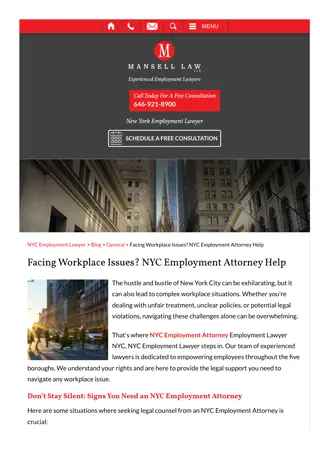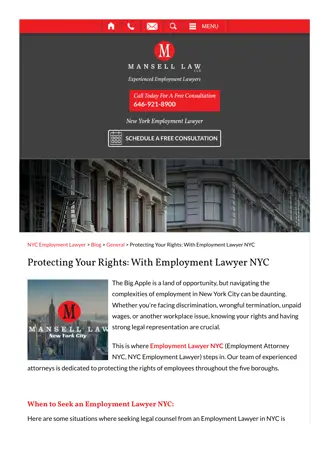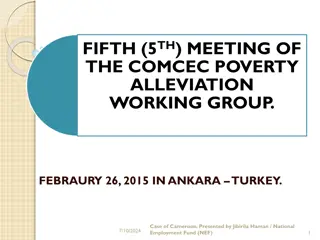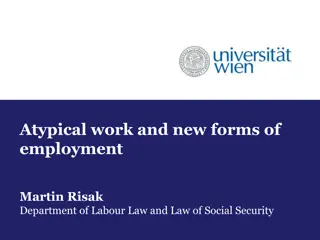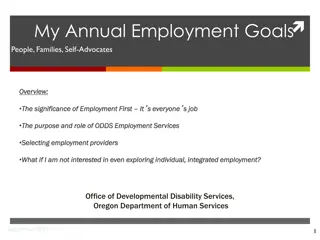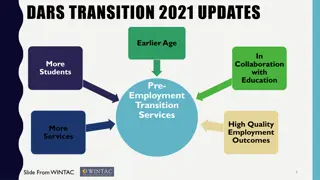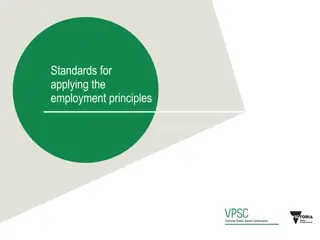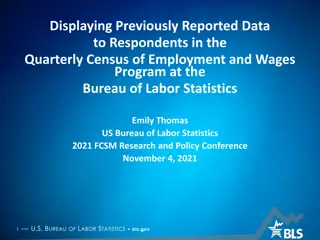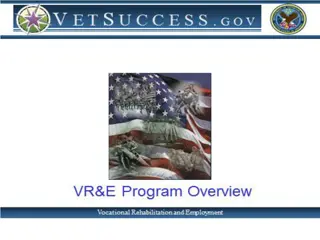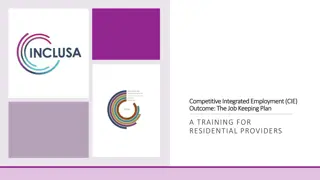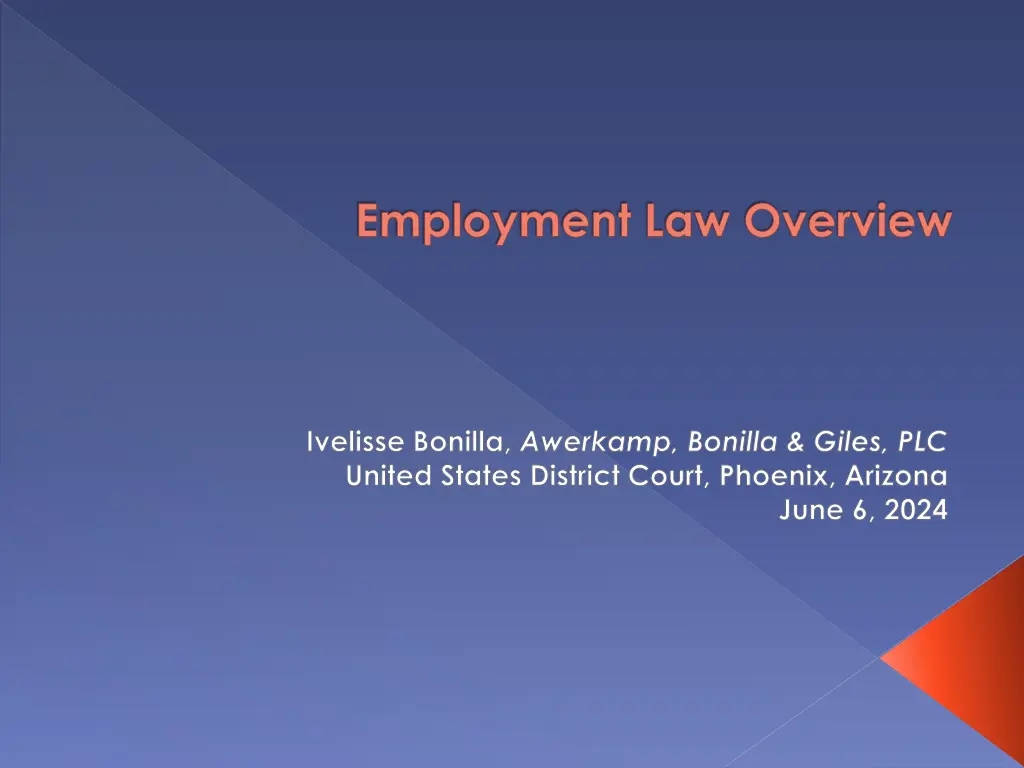
Understanding Employment Law Essentials
Explore the key aspects of employment law, including employer-employee dynamics, types of discrimination, relevant legislation, and the process of exhausting legal remedies. Gain insights into federal employee rights and the steps involved in filing discrimination complaints.
Download Presentation

Please find below an Image/Link to download the presentation.
The content on the website is provided AS IS for your information and personal use only. It may not be sold, licensed, or shared on other websites without obtaining consent from the author. If you encounter any issues during the download, it is possible that the publisher has removed the file from their server.
You are allowed to download the files provided on this website for personal or commercial use, subject to the condition that they are used lawfully. All files are the property of their respective owners.
The content on the website is provided AS IS for your information and personal use only. It may not be sold, licensed, or shared on other websites without obtaining consent from the author.
E N D
Presentation Transcript
Employment Law Overview Ivelisse Bonilla, Awerkamp, Bonilla & Giles, PLC United States District Court, Phoenix, Arizona June 6, 2024
Initial Questions to Ask Who is Employer Private or Public # of Employees Who Work for Employer How Long Has Employee Worked for Employer What is the Issue How much is Employee Paid
# of Employees Who Work for Employer ACRA (sexual harassment) 1 employee Title VII and ADA 15 employees ADEA 20 employees FMLA private employer - 50 employees (employee worked 1,250 hours)
What is the Issue Discrimination 180 days/300 days FMLA 2 years FLSA Violation 2 years/3 years intentional Retaliation/Whistleblowing Wrongful Termination Claim against the State based on state law, 180 days notice of claim
DISCRIMINATION Protected Characteristics ADEA Title VII AZ Civil Rights Act Race Color Religion Genetic Information National Origin Sex -- also Equal Pay Act, Pregnancy, Sexual Harassment Sexual Orientation Age -- 40+ Rehab. Act / ADA Disability -- physical / mental impairment that substantially limits a major life activity; a record of such impairment or is regarded / perceived as having such impairment Also known association
Exhausting Remedies Arizona Civil Rights Act Title VII, ADAA, ADEA File charge within 300 days of last act of discrimination No need to exhaust remedies Rehab. Act (disability) and RACE Section 1981 (race discrimination) File charge within 180 days File complaint within one year of filing charge of discrimination
DISCRIMINATION - FEDERAL EMPLOYEES MSPB EEO - EEOC Within 45 days of the discriminatory action, employee must contact the Agency s EEO office and file a complaint. The Agency will investigate and employee will be given options, including electing a Hearing before an EEOC Judge. An employee can file a mixed case - discrimination in connection with an action otherwise appealable to the Board.
Merit Systems Protection Board Federal employees may file an appeal with the MSPB within 30 days of the following adverse actions: Removals (terminations); Suspensions of more than 14 days; Demotions; and Other matters such as appeals of OPM determinations in retirement matters, among others.
Wrongful Termination - AEPA Firing in retaliation for: (i) Refusing to violate the Arizona Constitution or laws of Arizona, (ii) Telling ER that EE believes ER violated or will violate AZ Constitution/AZ laws (iii) Using Arizona s workers' compensation program.
Wrongful Termination cont. (iv) Serving on a jury (v) Voting in elections. (vi) Not joining a union. (vii) Serving in the national guard or armed forces. (viii) Refusing to pay fees or gratuities as a condition of employment. (ix) Refusing to purchase goods or supplies from any particular person as a condition of employment. (x) Using leave if the employee is a victim of a juvenile offense a victim of a crime.
How Much is Employee Paid AMWA FLSA As of January 1, 2024, the minimum wage in Arizona is $14.35/hr. Since July 24, 2009, the minimum wage under the FLSA is $7.25/hr. AZ minimum wage increases every January 1 by an amount equal to the percentage increase of the Consumer Price Index. Because the minimum wage under the AMWA is more generous, it takes precedence over the FLSA
COVERAGE The AMWA covers all employers in the private and public sectors except small businesses, the State of Arizona, and the federal government. The AMWA protects all employees of a covered employer except for a person who is employed by a parent or a sibling, or a person who is employed to perform babysitting services in the employer s home on a casual basis. The FLSA applies to employees based on their work activities as well as to employees of enterprises engaged in interstate commerce. Employees are covered if they engage in commerce or produce goods for commerce or if they work for an enterprise engaged in those activities. As a practical matter, the law covers almost all employees and employers in both the private and public sectors. An enterprise is engaged in commerce if it meets one of the following tests: (1) it has two or more employees engaged in commerce or has employees engaged in handling, selling, or otherwise working on goods that have been moved in or been produced for commerce, and it is a business whose annual gross sales are not less than $500,000; (2) it is a hospital, old- age home, or school; or (3) it is a public agency. A small business is defined as any entity that has less than $500,000 in gross annual revenue and is exempt from having to pay a minimum wage under the FLSA. This definition can cause some confusion because the FLSA does not contain any exclusion for small businesses. Rather, it asserts jurisdiction based on a defined impact upon interstate commerce. The AMWA does not require any ties to interstate commerce.
OVERTIME Employees who work in excess of 40 hours in any 7-day work week must receive compensation at a rate not less than one and one-half times the regular rate. Holidays, sick time, and vacation not included when counting 40 hours. Exempt vs non-exempt Exemptions for certain industries
RETALIATION PROHIBITED FLSA AMWA AMWA prohibits employers from retaliating against any person who asserts a claim or right under the law, who assists any other person in doing so, or who informs any person about his or her rights. Prohibits discharging or discriminating against because of filing complaint , instituting a proceeding and/or engaging in other protected activity. Employee may be entitled to equitable relief, including reinstatement, as well as damages. Protected activity includes filing an internal complaint. In a retaliation case, the employee s remedy is one of damages, both compensatory and punitive. Presumption of retaliation if ER takes adverse action within 90 days after a claim. The presumption may be rebutted by clear and convincing evidence that the action was taken for permissible reasons.
NO WAIVER No verbal or written agreement or employment contract may waive any rights under the AMWA or the FLSA.
AZ SICK TIME LAW Employees earn one hour of paid sick time for every 30 hours worked. Employees are entitled to at least 24 hours of paid sick time if the employer has 14 or fewer employees. The amount increases to 40 hours of paid sick time for employers with 15 or more employees. No retaliation
FMLA Coverage Birth or Placement of Child Serious Health Condition -- Employee s or immediate family member s (spouse, child or parent) Military family leave
FMLA Employee Eligibility Worked for a covered employer Employed for at least twelve months in any capacity (full time, part time, temporary) Worked 1250 hours in preceding 12 month period Worked at a location where at least 50 employees are employed by ER within 75 miles
Serious Health Condition Inpatient Care or Continuing treatment by a health care provider = absence of at least 3 consecutive days and treated at least twice *Chronic condition
AMERICAN WITH DISABILITIES ACT The ADA prohibits discrimination and guarantees that people with disabilities have the same opportunities as everyone else, such as to enjoy employment opportunities, to purchase goods and services, and to participate in State and local government programs and services. Title I of the Americans with Disabilities Act of 1990 prohibits private employers, state and local governments, employment agencies and labor unions from discriminating against qualified individuals with disabilities in job application procedures, hiring, firing, advancement, compensation, job training, and other terms, conditions, and privileges of employment.
ADA vs. Rehabilitation Act ADA Rehabilitation Act Employers must have 15 or more employees; Need to exhaust remedies Applies to federal government and private employers that receive federal funds. No need to exhaust remedies.
An Individual with a Disability Has a physical or mental impairment that substantially limits one or more major life activities; Has a history or record of such an impairment; or Is regarded by others as having such an impairment. The ADA does not specifically name all of the impairments that are covered.
A qualified employee or applicant with a disability is an individual who, with or without reasonable accommodation, can perform the essential functions of the job in question. Reasonable accommodation may include, but is not limited to: Making existing facilities used by employees readily accessible to and usable by persons with disabilities. Job restructuring, modifying work schedules, reassignment to a vacant position; Acquiring or modifying equipment or devices, adjusting or modifying examinations, training materials, or policies, and providing qualified readers or interpreters.
Undue Hardship An employer does not have to provide a reasonable accommodation if it imposes an "undue hardship." Undue hardship is defined as an action requiring significant difficulty or expense when considered in light of factors such as an employer's size, financial resources, and the nature and structure of its operation.
QUESTIONS? THANK YOU!

